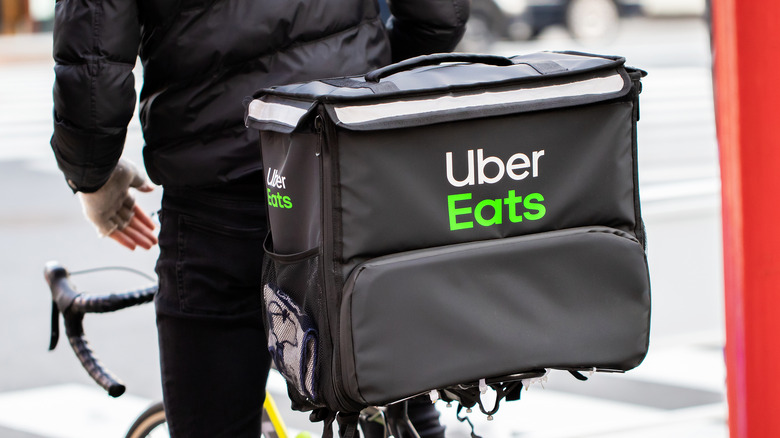Uber Eats' New Initiative Aims To Enable More Black-Owned Restaurants
We may receive a commission on purchases made from links.
If you're craving a late-night snack, you can order food and have it delivered to your front doorsteps with just a tap of your finger. Nowadays, there are several online food delivery platforms all within the reach of your phone. But, the first online ordering service dates back to 1995, when World Wide Waiter launched on the web, according to Verdict Food Service.
One of the most widely known online food ordering and delivery platforms today is UberEats. It was first launched in 2014 by rideshare app Uber and quickly turned into a standalone app by 2015 (via Uber). Approximately 81 million people use Uber Eats to satisfy their cravings, with about 900,000 restaurant partners on the app (per Business of Apps). The online ordering service generated about $8.3 billion in revenue in 2021. It may be from all those french fries, pad Thai, and garlic naan orders, per Uber Eats' "Cravings" report — they were the most ordered food items that year.
As Uber Eats continues to connect foodies to restaurants, the online food ordering and delivery platform is seeking to further its relationship with restaurants and small businesses, focusing its attention on Black-owned restaurants.
Uber Eats will invest in 35 Black-owned restaurants
Uber Eats is launching a new initiative to financially support Black-owned restaurants by offering loans with accommodating repayment options. According to a Feb. 7 press release, the Black Restaurant Fund, a joint effort by Uber Eats and the Local Initiatives Support Corporation, aims to "provide growth capital to Black restaurant owners and help break down some of the systemic financial barriers that often limit their opportunities."
Over the next three years, the Black Restaurant Fund will grant loans to 35 restaurants located in economically disadvantaged areas that are partners with Uber Eats. Restaurants must also generate between $250,000 and $3 million annually. The loans have flexible repayment options, and restaurants can repay once they "achieve targeted revenue growth."
The restaurant industry has a higher diversity rate compared to the overall private sector, according to the National Restaurant Association. 41% of restaurants are owned by minorities, compared to 30% in the private sector. However, just 9% of restaurants are Black-owned. And Restaurant Dive reports Black businesses still face financial challenges. "Thirty-seven percent of Black small business owners have found it difficult to access new capital and financing, 14 percentage points higher than their peers," Goldman Sachs told Restaurant Dive.

